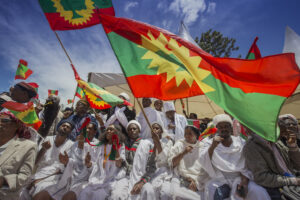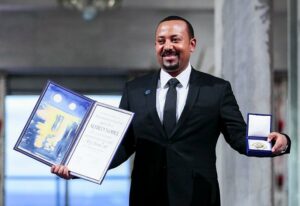Ethiopia is going through a complex political situation with external conflicts and strong internal racial tensions. The rise to power of Abiy Ahmed Ali1, leader of the Prosperity Party, seemed to initiate a democratic and peace process throughout the country, with the release of prisoners and the legalization of political groups2. However, two years later, this process could not be further from its objectives.
The country has more than 80 different ethnic groups and religions, with great conflicts among them. Thus, in 1990, the Ethiopian People’s Revolutionary Democratic Front (EPRDF) was established, representing the main ethnic groups of the country (Tigray, Amhara, Oromo and Southern People), although it was led by the Tigray. The EPRDF led the overthrow of the communist dictatorship in 1991 and remained in power until 2019, restructuring the administrative divisions into ethnic groups and constituting an “ethnic federalism” where nationalisms were institutionalized3.
The Amhara and Oromo peoples cooperated in 2018 to marginalize the Tigray, the former “privileged” ethnic group, but later nationalisms between them strengthened. The Oromo perceived that the Amhara had historically benefited from the imbalance of power at the expense of the rest. In turn, the Amhara saw the Oromo as the new wielders of power, although they continued to be perceived as historical victims.
Each Ethiopian ethnic group perceives the fragility of the state, the lack of political representation in the institutions, the oppression of minorities and the ethnic cleansing in each region from their own experience. This has produced a clear increase in ethno-nationalism and violence against the state, with large-scale displacement throughout the country and numerous murders4. Political leaders use the polarization of the population, based on economic competition for scarce resources, in order to achieve their goals in institutions.
Similarly to what happens in many areas of the planet, the root of the problems of the Ethiopian population is the populism of its elites and the differences of social classes, not an ethnic problem. As long as the population does not assume this on its own (which it will), the government of Abiy Ahmed must confront this inter-ethnic violence, modifying an administrative system that encourages political competition linked to ethnicity.
1 https://www.bbc.com/mundo/noticias-50011711 2 https://www.bbc.com/mundo/noticias-50011711 3 https://esdepolitologos.com/el-conflicto-etnico-en-etiopia-que-ha-puesto-en-duda-el-federalismo/ 4 https://elpais.com/internacional/2020-07-01/mas-de-50-muertos-en-etiopia-en-los-disturbios-por-el-asesinato-de-un-musico.html
More Information:
https://esdepolitologos.com/el-conflicto-etnico-en-etiopia-que-ha-puesto-en-duda-el-federalismo/
Become Interest:
BLACK FRIDAY: THE PLANET AS A COMMODITY
WHAT WILL CHANGE WITH TRUMP’S DEFEAT?
THE IMF AND AUSTERITY IN TIMES OF PANDEMIC


